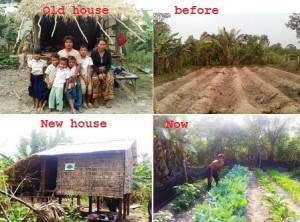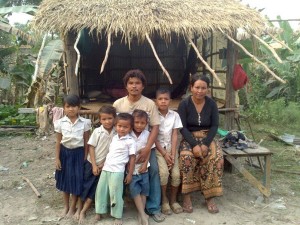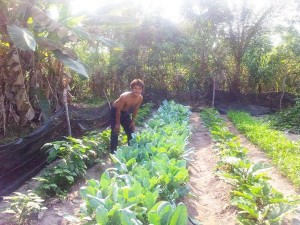Siem Reap, KH – Organic growing techniques improve yields – 20 Mar 2015
CK is a 33 year old father of five living in Peaksneng Village, Siem Reap. He is a young, strong, hardworking and determined man. He and his wife encounter many challenges and hardships raising their children as subsistence farmers including harsh living conditions, poor harvests, and little food to eat. Some days back, when their harvests were poor, they would eat whatever they could—fish, snakes, crabs, frogs, grasshoppers, crickets and small birds. When those were scarce, they recall eating only salted chili and peppers.
Weather patterns are changing rapidly, causing harsh water shortages in the dry season and severe flooding in the rainy season. Most farmers in Cambodia rely on rain to irrigate their crops and when the weather brings these extreme draughts and floods it causes poor crop yields, increase in food prices, and widespread hunger. Last year’s rainy season in the Siem Reap province was so poor that it cost the CK family almost their entire rice crop. A few years ago, CK was able to farm in both the dry and rainy seasons, but now he can only afford to plant rice during the rainy season. “I am a farmer, so I rely on how well my farm produces, but my land gets worse and worse every year,” he says. The combination of lack of rain and education on how to replenish soil with nutrients is a recipe for continuing poor yields.
Farmers who depend on rain-fed farming to grow their crops are going to continue to face difficulties with floods and drought, which means food will be hard to come by. “Lack of food also presents an increased risk of malnutrition. When you are not eating quality food it impacts your family’s health” says Reynaldo Diez, manager of the Peaksneng Thormacheat Garden Shop. Rey says that when there is not enough food with nutritional value for children, they begin to get sick more often and the families have to spend more money on health services.
CK has a small piece of land where he grows rice, bananas, cassava and maize, but he says that, “my family has not had enough food to eat because of the floods and droughts in the past few years.” In vulnerable regions like Southeast Asia, there is a great importance of training local people in proper farming techniques so that the weather becomes less of a factor.
The Peaksneng Thormacheat Garden Shop in Siem Reap implements organic FAITH (Food Always in the Home) gardens and mentors families in best practice farming techniques. CK received support from the Peaksneng Thormacheat Shop with the hope of lessening the difficulties of feeding his family. He started his garden in March 2014. In a fairly short time, his hard work and perseverance started to produce results. His positive attitude and impressive garden has drawn attention from local organizations that want to help, after meeting CK and his family at their home, one local organization helped him build a small house where his children can feel safe and happy.
 CK’s organic vegetable garden helps his family eat every day and earn an income of US$6 by selling surplus vegetable to the market. After many months cultivating his garden he is starting to apply the FAITH garden techniques to his other farming activities. He used to only plant rice, cassava, and banana in his farm and now is learning how to grow many different kinds of vegetable that fetch a higher price at the market and are also more beneficial to his family’s health.
CK’s organic vegetable garden helps his family eat every day and earn an income of US$6 by selling surplus vegetable to the market. After many months cultivating his garden he is starting to apply the FAITH garden techniques to his other farming activities. He used to only plant rice, cassava, and banana in his farm and now is learning how to grow many different kinds of vegetable that fetch a higher price at the market and are also more beneficial to his family’s health.
CK is also learning how important the health of the soil is to crop yields, and is beginning to rotate his vegetables with legumes to help fix more nitrogen in the soil as well as break pest cycles. He is very thankful for the support he is getting to become self-reliant and educated about the importance of health and soil. “My dream is to one day have a good source of income, be able to support my children in school and build my dream home, “ says CK.


